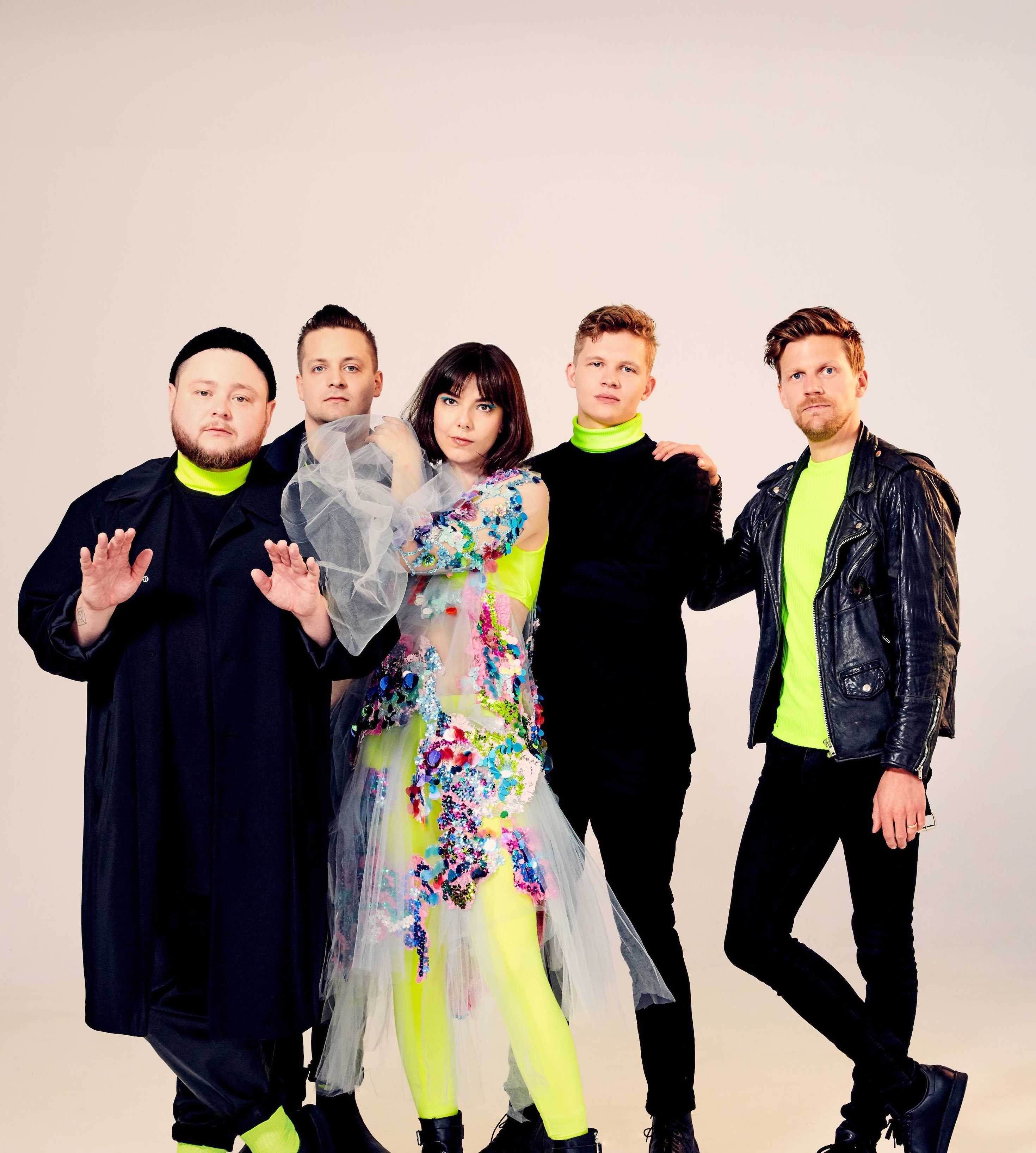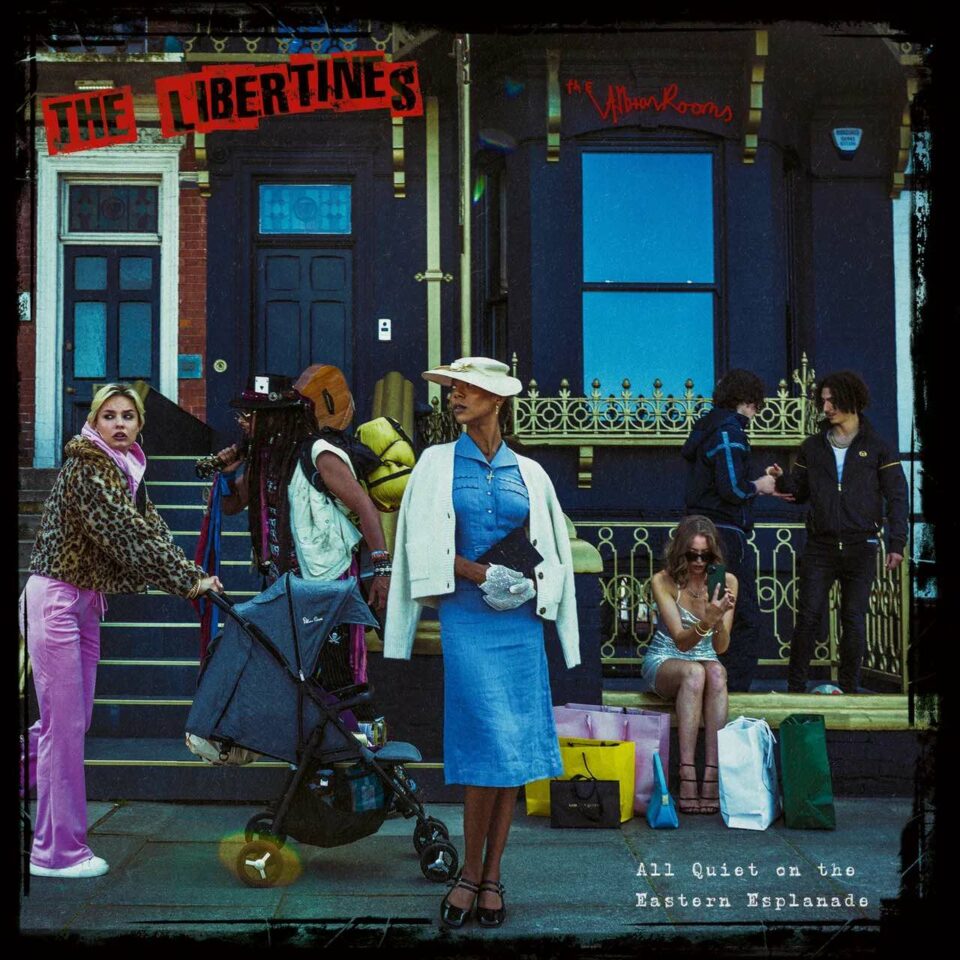It’s a little jarring to see Of Monsters and Men’s frontwoman Nanna Bryndís Hilmarsdóttir—like going back in time twenty-five years and facing a young Björk. Hilmarsdóttir surely gets this comparison a lot, especially considering she shares Björk’s Icelandic heritage and has a similarly charming accent—albeit with a decidedly American lilt. Donning an olive green jumpsuit with delicate gold necklaces circling her neck under a choppy haircut, Hilmarsdóttir still looks like a fresh-faced teenager, even if she’s left those years behind.
Hilmarsdóttir is on a short break from Of Monsters and Men’s rehearsals for their long string of tour dates in support of their third album, Fever Dream. She sips a warm drink from a white porcelain mug while dogs gambol about the airy studio in Reykjavík that she shares with her fellow bandmates, vocalist/guitarist Ragnar Þorhallsson, guitarist Brynjar Leifsson, bassist Kristjan Pall Kristjansson, and drummer Arnar Rosenkranz Hilmarsson. Of Monsters and Men have three studio dogs, which they claim make the space “cozy.”
Considering how much time the band spends in their studio, it’s essential that it be as comfortable as possible. It’s been a whirlwind for Of Monsters, who since their perennial alt-rock hit “Little Talks” almost a decade ago, have been on a steady upswing. They’ve completed tour after increasingly large tour, performed at better and better festival time slots, made high-profile television appearances (including as a band on Game of Thrones), and had their music appear in many films and series, all the while racking up the Spotify streams.
Fever Dream was preceded by the well-received “Alligator,” the Hilmarsdóttir-penned and vocalized single that served as an indication of where the indie folk five-piece are taking their music—which, for the first time, sees a clear distinction between Of Monsters and Men’s two central songwriters. Here, Hilmarsdóttir explains it all.
Why did you decide to change your working process to write separately?
The ideas usually come from one person. Before, maybe I would pick up an acoustic guitar and use that for writing. But I had been feeling very bored with the process of writing that way. I felt like I knew what was going to happen when I picked up a guitar. It wasn’t very inspiring. The laptop suddenly felt like this new magical thing, this whole new world, and we wanted to explore that, so we went our separate ways.
You hadn’t written on a laptop prior to this album?
Producing tracks on a laptop was something I was very drawn to, but I did not know what I was doing. I come from a singer-songwriter background, very organic, having the piano in front of me and creating the whole landscape of the song that way, not really relying on anything but just that one instrument and your voice. I did not know what I was doing when starting to write this album, which I think is good because you approach it with a naïve, childish attitude. There are no rules.
That’s a steep learning curve, spending more time working out the technical side than actually creating.
It was very frustrating, and I’m horrible at knowing how to Google things. There is the whole cliché of being an artist and [ideas] coming over you and you follow them. It’s true in some ways, but it’s also making the time for that to happen. I was very strict with myself. Wake up, get coffee, get breakfast, go upstairs to my workspace and I’m working all day. Maybe the entire day is going to be me figuring out how to make this plug-in make any sense. And then maybe in the evening I feel super-creative and I can use it. It was constantly me locking myself in a room, being alone, marinating and not getting dressed for a few days.
“Coming from Iceland, everything is a different tempo. It’s very calm. Nothing to do here. It’s boring. You need to be bored to write something.”
That’s an admirable level of discipline. Musicians say changing their writing instrument is a big catalyst for their music moving forward.
I had to be that disciplined, otherwise I wouldn’t get there. We could have gone the way we had done it before. It was uncomfortable for the band that we wanted to go this different route. We had to have a discussion with them because they didn’t really get it at first. But it was definitely necessary. I don’t think I could have gone into the studio and done it the way we had done it before. It didn’t feel like something I was inspired by anymore.
Lyrically, was it more difficult not being able to bounce ideas off of and trade words with Raggi?
Yes, a bit, but I used to write like that all the time, before the band. When Raggi and I would work on our lyrics together, we were trying to mask them. The lyrics on this album are much more personal and bare. They’re layered in a way, but not like we’ve done before where it was all a bit vague. Now, it’s more in-your-face and personal—but that comes with us giving each other the space to say what we want to say. When you write a lyric, it’s a steady flow that’s coming out. When you’re in a conversation and talking about your feelings, you filter all the time. With songs, it’s so pure, it’s a direct thing. It comes right through you with no filter. We did a lot of that with this album.
Your limited edition exclusive vinyl with special artwork from Jón Sæmundur is so primal, savage, and beautiful. The album cover is a tamer take on Sæmundur’s work, which is probably best for American audiences.
Things seem very crazy and very dramatic in America. It’s such a big place, it’s insane that it’s just one country. You’re not going to get that many people to agree. It does seem like people are very much closed to either side of the issues and there’s no real conversation. It’s allowed, but it’s not really allowed, is it? I was watching Kanye West on My Next Guest Needs No Introduction with David Letterman yesterday. His point, which I thought was interesting, was basically that people are not allowed to have different opinions. If you have a different opinion, why are we all getting upset about it? I have my opinion, you have your opinion.
Did you ever think about moving to the U.S., considering how big your fanbase is here?
We’ve never thought about moving. It would probably make sense, but a huge part of why we make the music is being here in Iceland and being part of living here. There is this whole thing nowadays in music where everything is so quick. Coming from Iceland, everything is a different tempo. It’s very calm. Nothing to do here. It’s boring. You need to be bored to write something.
You spend a lot of time away from Iceland on tour. That, along with so much of your music being synced to film and television, seem to be the main propellers for band’s continuous rise.
We are on the road a lot. We enjoy it, but this time we have different circumstances because our drummer had a baby—but everyone is super excited about going back on the road. For me, I really love traveling and playing for people.
What if you had a baby?
I’m sure it could work, but being a woman and trying to have a career, it is a bit tricky. I’m so focused on the music. You have to prioritize. I just got a dog and that’s a responsibility. Thinking about another being, I’m too focused right now. No baby yet. FL









